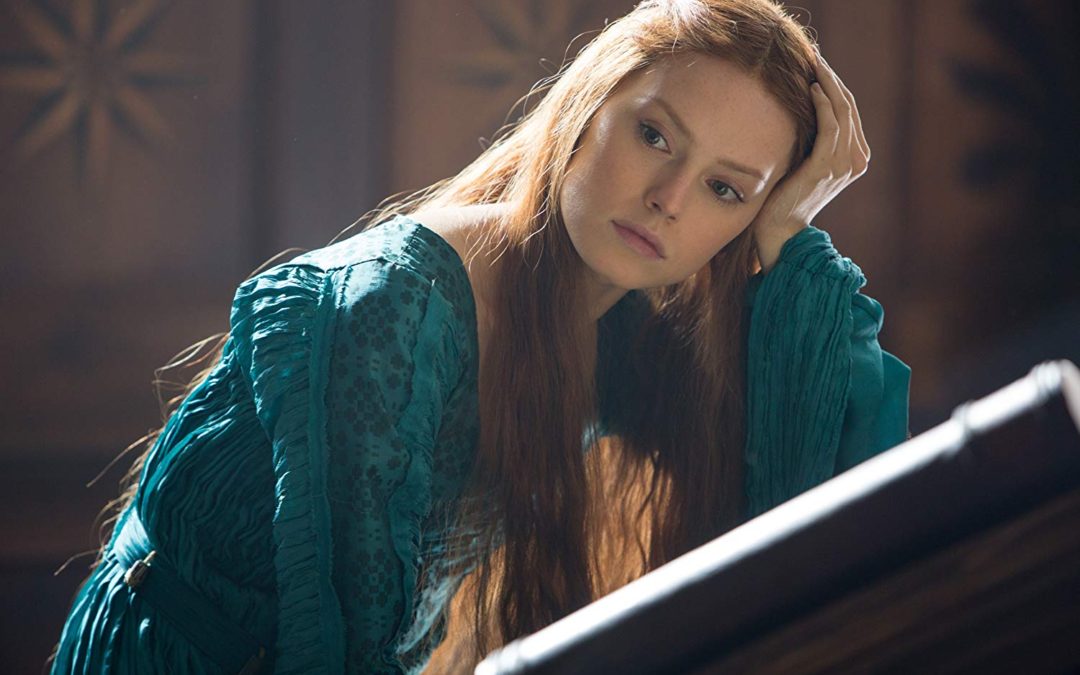(IMAGE: IFC Fims)
IFC Films. 2018. Drama. 114 minutes.
RATING: 2 1/2 angels
It’s a fairly safe bet that Ophelia exists because somebody, or perhaps multiple somebodies, said to themselves one day, “Hey, Hamlet sure does seem very Game of Thrones-y, with all the royal intrigue, familial perversity, supernatural stuff and all the good guys dying and whatnot.” This is roughly akin to saying Akira Kurosawa’s filmography seems vaguely Star Wars-like, but whatever. Leading audiences to Shakespeare any way it happens is a noble goal, and recasting classical literature in a feminist light, particularly reclaiming “crazy” women as role models when male narratives typically do the opposite, is fine. No doubt Daisy Ridley, plucked from obscurity to star in a certain big-budget trilogy where her character is often unfairly maligned as generic wish fulfillment, jumped at the chance to play Hamlet’s lady love as modern protagonist. But unless one is willing to radically change the story, there’s no getting around the fact that Ophelia is essentially a passive, reactive character.
If Ridley’s goal was to showcase her acting ability, mission accomplished. There’s a moment early on in which Ophelia, thinking she’s about to read prayers to the queen, finds that the book at hand is erotica instead, and cracks up at the awkwardness of it. It’s tough to tell if that’s actually Ridley breaking character, or Ophelia failing to keep up appearances, but it doesn’t matter: the genuineness of the moment plays. And anyone smitten with the “Reylo” maybe-romance in Star Wars with Adam Driver will probably be even more impressed here, as her mind and body convincingly hunger for George MacKay’s Hamlet, who may be the least romantically desirable incarnation I can recall at present.
Had Ridley, and Naomi Watts, Clive Owen, Tom Felton and the rest of the cast gone for a fully faithful Hamlet, few could complain, But if you’re going to subvert the thing, you have to go big, like Rosencrantz and Guildenstern Are Dead. Looking to change the theme yet unwilling to actually depart from all the major plot points, Ophelia comes off overly tentative. Definite credit is due for the bizarre identical twin twist worthy of any unrespectable daytime soap, and it more than makes up for the Tommy Wiseau wig Owen is forced to angrily emote through. But when your main heroine really only takes charge in the third act, it doesn’t feel quite like the feminist reclamation one expects. In the end, you are basically watching a version of Hamlet with bonus deleted scenes, and dialogue that tries to be poetic without alienating any masses who’d think Shakespeare too fancy.
Director Claire McCarthy (The Waiting City) keeps everything looking great, with GoT-style CG medieval backdrops where appropriate, and actual ruins when necessary. And by leading with the image of Ophelia in the lake, she’s daring us to expect the inevitable, and how it may get twisted. But a major part of Game of Thrones‘ hook was the unpredictability — imagine an alternate Ophelia in which Hamlet gets killed right at the beginning, and you’d capture the George R. R. Martin spirit more. Once it’s clear this movie will hit all the key moments you expect, it instantly gets less exciting. Sure, showing that the “madness” suffered by both Hamlet and Ophelia is an act to throw people off is a twist, but it’s probably the most obvious twist imaginable.
There’s nothing especially wrong with this take, but there’s nothing particularly remarkable, either. The ending suggests more happened after the events of Hamlet, and in a significant way — couldn’t we get that story, instead? Based on what we see, nothing in this movie is actually the be-all, end-all. Perhaps there’s hope for a sequel, but I’ve learned from Steve Coogan that Hamlet 2 tends not to end well.

